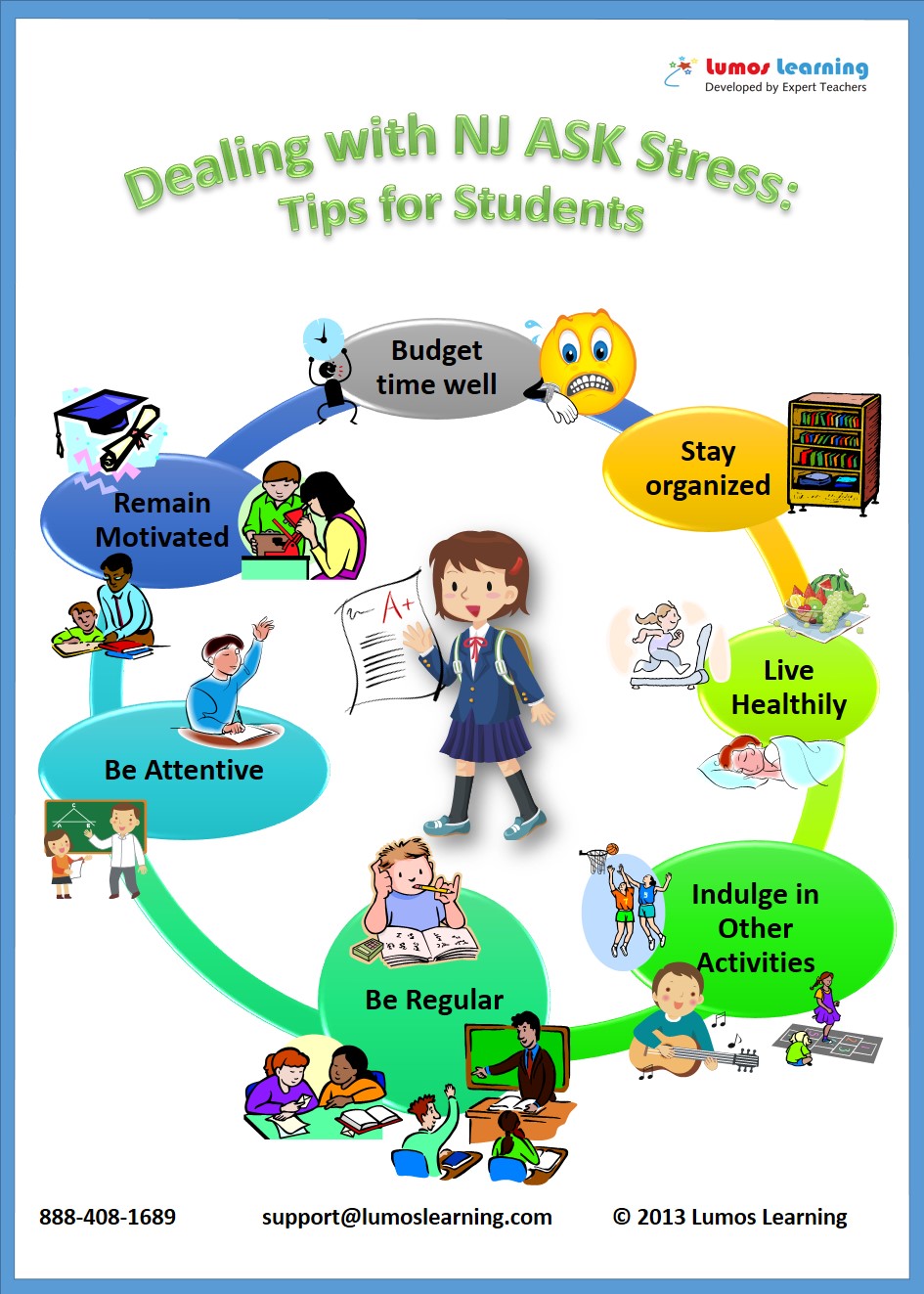In all walks of life, we are susceptible to pressure and stress – resulting in negative side effects that range from health complications, to constant worry, to a feeling of general anxiety or unhappiness. Students and teachers are no different, and as the NJ ASK quickly approaches, classroom stress begins to peak. Teachers worry about how their students will do and if they’ve adequately prepared their young test-takers, while students have their own set of worries about their ability to perform with proficiency and to endure the lengthy test sessions. The following tips will help you, as a teacher or student, to both manage stress and prepare for the NJ ASK – without sacrificing your health, mood, or well-being:

For Students:
• Budget your time.
For most students, the NJ ASK is timed, so it’s important to begin practicing now. Get a feel for how long it takes you to answer an open-ended question, read a passage, write a persuasive essay, etc. Once you know how quickly (or slowly) you work, determine attainable time limits to allow you to finish each section of the test with time to spare – giving you the opportunity to check your answers and/or reread your writing. Keeping your eye on the clock will also help you decide when to skip a question (and return to it later) and when to continue working on it.
• Be present.
First, being present means that you need to attend your classes regularly. Too many missed days – or simply showing up late to school – will cause you to fall behind in your work, and you’ll miss out on important instructional time with your teacher. Being present also means focusing when you are in class . . . by paying attention, focusing your attention to each task you complete, and thinking about what you’ve learned at the end of each day. This way, if you notice you don’t understand something, you can speak up and talk to your teacher. Most teachers are more than happy to help you, because they want you to succeed – and all you need to do is ask!
• Be healthy.
Get to bed at a reasonable hour, eat healthy foods, and drink plenty of water. These simple actions go a long way in helping you feel relaxed, rested, and focused. Healthy routines also prevent you from getting run down . . . which will cut down on sick days, too. Another great way to improve your energy levels is by exercising, whether it’s from taking your dog for a walk, playing a sport, or just going for a jog with a friend. Some people think exercise makes you more tired, but it appears that the reverse is true: a study from the University of Georgia revealed that people who suffer from fatigue can actually combat their tiredness with exercise (Parker-Pope, 2008).
For Teachers:
• Streamline.
Look at your lesson plans, and cross-reference what you’re doing in the classroom with what students can expect to see on NJ ASK. This way, you can create lessons that address your curricular goals while simultaneously preparing them for the test. Some simple ideas: time students on short reading passages to help them start pacing themselves, design open-ended responses that mirror ones they may encounter on the test, etc.
• Reinforce vocabulary.
It’s a terrible feeling for a teacher when he or she realizes that the student knows the answer, but because that student didn’t understand the question or directions, he or she gets the answer wrong. By looking at NJ ASK-released samples, you can get a flavor for the wording of directions and general vocabulary that students are expected to know. (See Surviving Standardized Tests: Helping Students Make the Grade for more ideas related to this topic.) Help refresh students’ memories (or teach them words they don’t know) by using these terms yourself as you give directions and design test questions.
• Make time for yourself.
It’s easy to get caught up in the business of the school day and then not leave enough time for yourself after work. And for those of you with families and other after-school commitments, your day might only be half-over when the final bell rings! As difficult as it can be, commit to carving out time each day for yourself – even if it’s just fifteen or twenty minutes daily. You can use that time to read, watch a fun TV show, meditate, take a nap, exercise, indulge in a hobby, shop . . .really, anything that gives your mind a break from the demands of teaching – and life in general – can give you that boost to attend to your responsibilities with renewed enthusiasm. Paradoxically, the time you take for yourself usually results in your being more productive with the remaining time you have each day. If you don’t believe me on this one, try it! You’ll prioritize better and realize that you can still “do it all” (or at least, do most everything you need to do) . . . and be happier, too.
Old man winter hasn’t been kind to school schedules this year, making consistency in the classroom difficult . . . and making adequate test preparation a challenge. However, with some common sense and conscious effort to manage stress, it’s entirely possible to make this year’s NJ ASK less wearisome and taxing – for teachers and students alike.




Pingback: Dealing with Stress and NJ ASK: Tips for Students and Teachers | Think Educative